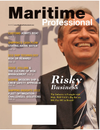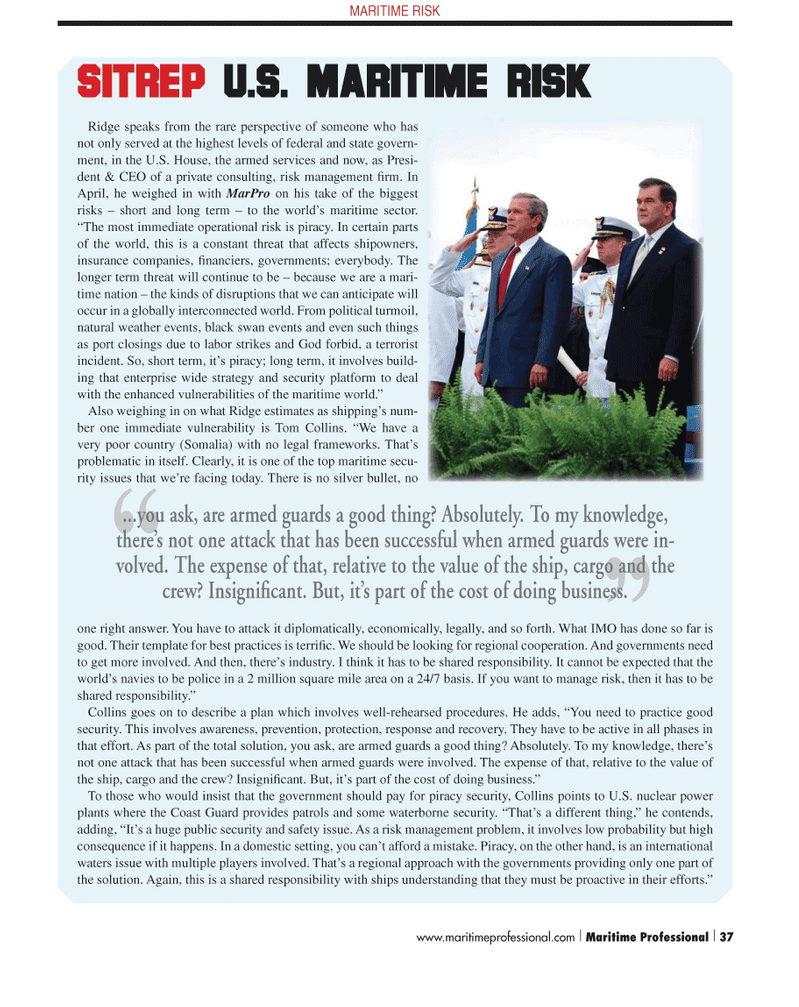
Page 37: of Maritime Logistics Professional Magazine (Q2 2012)
Maritime Risk
Read this page in Pdf, Flash or Html5 edition of Q2 2012 Maritime Logistics Professional Magazine
SITREP U.S. Maritime Risk
Ridge speaks from the rare perspective of someone who has not only served at the highest levels of federal and state govern- ment, in the U.S. House, the armed services and now, as Presi- dent & CEO of a private consulting, risk management fi rm. In
April, he weighed in with MarPro on his take of the biggest risks – short and long term – to the world’s maritime sector. “The most immediate operational risk is piracy. In certain parts of the world, this is a constant threat that affects shipowners, insurance companies, fi nanciers, governments; everybody. The longer term threat will continue to be – because we are a mari- time nation – the kinds of disruptions that we can anticipate will occur in a globally interconnected world. From political turmoil, natural weather events, black swan events and even such things as port closings due to labor strikes and God forbid, a terrorist incident. So, short term, it’s piracy; long term, it involves build- ing that enterprise wide strategy and security platform to deal with the enhanced vulnerabilities of the maritime world.”
Also weighing in on what Ridge estimates as shipping’s num- ber one immediate vulnerability is Tom Collins. “We have a very poor country (Somalia) with no legal frameworks. That’s problematic in itself. Clearly, it is one of the top maritime secu- rity issues that we’re facing today. There is no silver bullet, no one right answer. You have to attack it diplomatically, economically, legally, and so forth. What IMO has done so far is good. Their template for best practices is terrifi c. We should be looking for regional cooperation. And governments need to get more involved. And then, there’s industry. I think it has to be shared responsibility. It cannot be expected that the world’s navies to be police in a 2 million square mile area on a 24/7 basis. If you want to manage risk, then it has to be shared responsibility.”
Collins goes on to describe a plan which involves well-rehearsed procedures. He adds, “You need to practice good security. This involves awareness, prevention, protection, response and recovery. They have to be active in all phases in that effort. As part of the total solution, you ask, are armed guards a good thing? Absolutely. To my knowledge, there’s not one attack that has been successful when armed guards were involved. The expense of that, relative to the value of the ship, cargo and the crew? Insignifi cant. But, it’s part of the cost of doing business.”
To those who would insist that the government should pay for piracy security, Collins points to U.S. nuclear power plants where the Coast Guard provides patrols and some waterborne security. “That’s a different thing,” he contends, adding, “It’s a huge public security and safety issue. As a risk management problem, it involves low probability but high consequence if it happens. In a domestic setting, you can’t afford a mistake. Piracy, on the other hand, is an international waters issue with multiple players involved. That’s a regional approach with the governments providing only one part of the solution. Again, this is a shared responsibility with ships understanding that they must be proactive in their efforts.”
MARITIME RISK www.maritimeprofessional.com | Maritime Professional | 37 ” “ ...you ask, are armed guards a good thing? Absolutely. To my knowledge, there’s not one attack that has been successful when armed guards were in- volved. The expense of that, relative to the value of the ship, cargo and the crew? Insignifi cant. But, it’s part of the cost of doing business.
MP #2 34-49 NEW STYLES.indd 37 5/4/2012 5:12:22 PM

 36
36

 38
38
